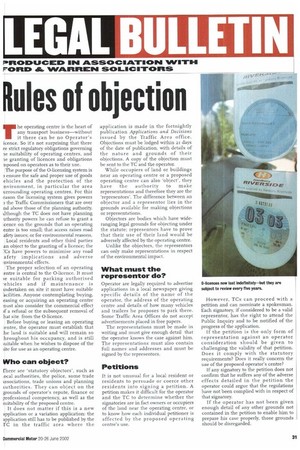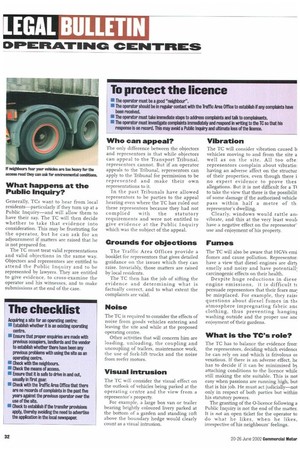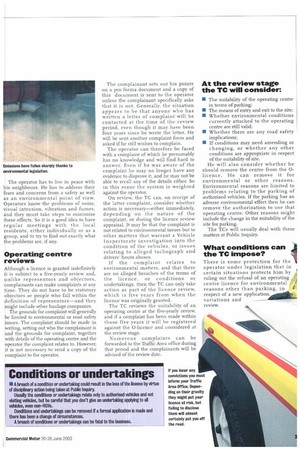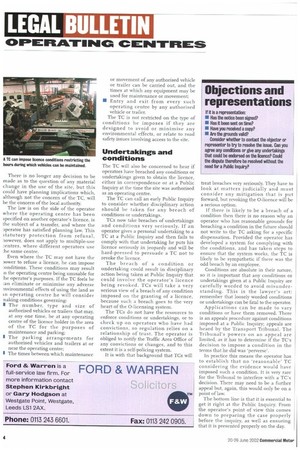LEGAL ULLETIN
Page 31

Page 32

Page 33

Page 34

If you've noticed an error in this article please click here to report it so we can fix it.
PROIDUcwa IN ASSOCIATION rORCIN 4%. WARREN SOLICITORS
Rules of objection
The operating centre is the heart of any transport business—without it there can be no Operator's icence. So it's not surprising that there re strict regulatory obligations governing le suitability of operating centres, and le granting of licences and obligations atposed on operators as to their use.
The purpose of the 0-licensing system is a ensure the safe and proper use of goods ehicles and the protection of the nvironment, in particular the area urrounding operating centres. For this eason the licensing system gives powers 3 the Traffic Commissioners that are over nd above those of the planning authority. dthough the TC does not have planning uthority powers he can refuse to grant a :cence on the grounds that an operating entre is too small; that access raises road afety issues; or for environmental reasons.
Local residents and other third parties an object to the granting of a licence; the :Cs have powers to minimise any road afety implications and adverse .nvironmental effects.
The proper selection of an operating .entre is central to the 0-licence. It must ie suitable for parking authorised 'ehicles and if maintenance is tndertalcen on site it must have suitable 'acilities. Anyone contemplating buying, easing or acquiring an operating centre nust also consider the commercial effect if a refusal or the subsequent removal of hat site from the 0-licence.
Before buying or leasing an operating :entre, the operator must establish that he land is suitable and will remain so hroughout his occupancy, and is still ;uitable when he wishes to dispose of the ;ite for use as an operating centre.
Who can object?
There are 'statutory objectors', such as .ocal authorities, the police, some trade associations, trade unions and planning authorities. They can object on the ;rounds of operator's repute, finance or professional competency, as well as the mitability of the proposed centre.
It does not matter if this is a new application or a variation application: the application still has to be published by the TC in the traffic area where the
application is made in the fortnightly publication Applications and Decisions issued by the Traffic Area office. Objections must be lodged within 21 days of the date of publication, with details of the nature and grounds of their objections. A copy of the objection must be sent to the TC and the operator.
While occupiers of land or buildings near an operating centre or a proposed operating centre can also 'object', they have the authority to make representations and therefore they are the 'representors'. The difference between an objector and a representor lies in the grounds available for making objections or representations.
Objectors are bodies which have wideranging legal grounds for objecting under the statute; representors have to prove that their use of their land would be adversely affected by the operating centre.
Unlike the objectors, the representors can only make representations in respect of the environmental impact.
What must the representor do?
Operator are legally required to advertise applications in a local newspaper giving specific details of the name of the operator, the address of the operating centre and details of how many vehicles and trailers he proposes to park there. Some Traffic Area Offices do not accept advertisements placed in free papers.
The representations must be made in writing and must give enough detail that the operator knows the case against him. The representations must also contain full names and addresses and must be signed by the representors.
Petitions
It is not unusual for a local resident or residents to persuade or coerce other residents into signing a petition. A petition makes it difficult for the operator and the TC to determine whether the signatories are in fact owners or occupiers of the land near the operating centre, or to know how each individual petitioner is affected by the proposed operating centre's use. However, TCs can proceed with a petition and can nominate a spokesman. Each signatory, if considered to be a valid representor, has the right to attend the Public Inquiry and to be notified of the progress of the application.
If the petition is the only form of representation against an operator consideration should be given to challenging the validity of that petition. Does it comply with the statutory requirements? Does it really concern the use of the proposed operator's centre?
If any signatory to the petition does not confirm that he suffers any of the adverse effects detailed in the petition the operator could argue that the regulations have not been complied with in respect of that signatory.
If the operator has not been given enough detail of any other grounds not contained in the petition to enable him to prepare his case properly, those grounds should be disregarded.
What happens at the Public Inquiry?
Generally, TCs want to hear from local residents—particularly if they turn up at a Public Inquiry—and will allow them to have their say. The TC will then decide whether to take that evidence into consideration. This may be frustrating for the operator, but he can ask for an adjournment if matters are raised that he is not prepared for.
The TC must treat valid representations and valid objections in the same way. Objectors and representors are entitled to attend the Public Inquiry and to be represented by lawyers. They are entitled to give evidence, to cross-examine the operator and his witnesses, and to make submissions at the end of the case. The only difference between the objectors and representors is that while objectors can appeal to the Transport Tribunal, representors cannot. But if an operator appeals to the Tribunal, representors can apply to the Tribunal for permission to be represented and make their own representations to it.
In the past Tribunals have allowed representors to be parties to the appeal hearing even where the TC has ruled out these representors because they had not complied with the statutory requirements and were not entitled to give evidence at the Public Inquiry which was the subject of the appeal.
Grounds for objections Fumes
The Traffic Area Offices provide a booklet for representors that gives detailed guidance on the issues which they can raise. Invariably, those matters are raised by local residents.
The TC then has the job of sifting the evidence and determining what is factually correct, and to what extent the complaints are valid.
Noise
The TC is required to consider the effects of noise from goods vehicles entering and leaving the site and while at the proposed operating centre.
Other activities that will concern him are loading, unloading, the coupling and uncoupling of trailers, maintenance work, the use of fork-lift trucks and the noise from reefer motors.
Visual intrusion
The TC will consider the visual effect on the outlook of vehicles being parked at the operating centre and the view from a representor's property.
For example, a large box van or trailer bearing brightly coloured livery parked at the bottom of a garden and standing loft above the boundary hedge would clearly count as a visual intrusion.
The TC will consider vibration caused b vehicles moving to and from the site a well as on the site. All too ofte. representors complain about vibratio: having an adverse affect on the structur of their properties, even though there i no expert evidence to prove thes allegations. But it is not difficult for a Tc to take the view that there is the possibilit of some damage if the authorised vehide pass within half a metre of th representor's dwelling.
Clearly, windows would rattle an, vibrate, and this at the very least woull have a negative effect on the representor' use and enjoyment of his property.
The TC will also be aware that HGVs emi fumes and cause pollution. Representor have a view that diesel engines are dirt) smelly and noisy and have potential]: carcinogenic effects on their health.
Despite huge reductions in diese engine emissions, it is difficult ti persuade representors that their fears ma■ be misplaced. For example, they raisi questions about diesel fumes in tilt atmosphere impregnating fabric anc clothing, thus preventing hanging washing outside and the proper use anc enjoyment of their gardens.
What is the TC's role?
The TC has to balance the evidence froir the representors, deciding which evidence he can rely on and which is frivolous oi vexatious. If there is an adverse effect, he has to decide if it can be minirnised attaching conditions to the licence while still making the site suitable. This is not easy when passions are running high, but that is his job. He must act judicially—not only in respect of both parties but within his statutory powers.
The granting of the 0-licence following a Public Inquiry is not the end of the matter. It is not an open ticket for the operator to do what he likes, when he likes, irrespective of his neighbours' feelings.
The operator has to live in peace with his neighbours. He has to address their fears and concerns from a safety as well as an environmental point of view. Operators know the problems of noise, visual intrusion, vibration and fumes, and they must take steps to minimise these effects. So it is a good idea to have regular meetings with the local residents, either individually or as a group, and to try to find out exactly what the problems are, if any.
Operating centre reviews
Although a licence is granted indefinitely it is subject to a five-yearly review and, unlike representors and objectors, complainants can make complaints at any time. They do not have to be statutory objectors or people who fall within the definition of representors—and they might include other haulage companies.
The grounds for complaint will generally be limited to environmental or road safety issues. The complaint should be made in writing, setting out who the complainant is and the grounds for complaint, together with details of the operating centre and the operator the complaint relates to. However, it is not necessary to send a copy of the complaint to the operator. The complainant sets out his points on a pro forma document and a copy of this document is sent to the operator unless the complainant specifically asks that it is not. Generally, the situation appears to be that anyone who has written a letter of complaint will be contacted at the time of the review period, even though it may have been four years since he wrote the letter. He will be sent another complaint form and asked if he still wishes to complain.
The operator can therefore be faced with a complaint of which he presumably has no knowledge and will find hard to answer. Even if he was aware of the complaint he may no longer have any evidence to disprove it, and he may not be able to recall any of the details either. So in this sense the system is weighted against the operator.
On review, the TC can, on receipt of the latter complaint, consider whether action is necessary—either immediately, depending on the nature of the complaint, or during the licence review appraisal. It may be that the complaint is not related to environmental issues but to other matters that warrant a Vehicle Inspectorate investigation into the condition of the vehicles, or issues relating to alleged tachograph and drivers' hours abuses.
If the complaint relates to environmental matters, and that there are no alleged breaches of the terms of the licence, or conditions or undertakings, then the TC can only take action as part of the licence review, which is five years from when the licence was originally granted.
The TC reviews the suitability of an operating centre at the five-yearly review, and if a complaint has been made within those five years it will be registered against the 0-licence and considered at the review stage.
Numerous complaints can be forwarded to the Traffic Area office during that period and the complainants will be advised of the review date.
At the review stage the TC will consider:
• The suitability of the operating centre in terms of parking; • The means of entry and exit to the site; • Whether environmental conditions currently attached to the operating centre are still valid; • Whether there are any road safety implications; • If conditions may need amending or changing, or whether any other conditions are appropriate in respect of the suitability of site.
He will also consider whether he should remove the centre from the 0 licence. He can remove it for environmental or other reasons. Environmental reasons are limited to problems relating to the parking of authorised vehicles. If the parking has an adverse environmental effect then he can remove the authorisation to use that operating centre. Other reasons might include the change in the suitability of the site for parking.
The TCs will usually deal with these matters at Public Inquiry.
What conditions can the TC impose?
There is some protection for the operator under legislation that in certain situations protects him by
, ruling out the refusal of an operating k i centre licence for environmental /1! reasons other than parking, in X' respect of a new application,
variations and .... . review. There is no longer any decision to be made as to the question of any material change in the use of the site, but this could have planning implications which, although not the concern of the TC, will be the concern of the local authority.
The law is on the side of the operator where the operating centre has been specified on another operator's licence, is the subject of a transfer, and where the Dperator has satisfied planning law. This statutory protection from refusal, iowever, does not apply to multiple-use :entres, where different operators use :he same centre.
Even where the TC may not have the 3ower to refuse a licence, he can impose :onditions. These conditions may result n the operating centre being unusable for he operator's purposes. If the TC feels he :an eliminate or minimise any adverse .rIvironmental effects of using the land as in operating centre he will consider naking conditions governing: I The number, type and size of authorised vehicles or trailers that may, at any one time, be at any operating centre of the licence holder in the area of the TC for the purposes of maintenance and parking;
The parking arrangements for authorised vehicles and trailers at or near the operating centre; The times between which maintenance or movement of any authorised vehicle or trailer can be carried out, and the times at which any equipment may be used for maintenance or movement; • Entry and exit from every such operating centre by any authorised vehicle or trailer.
The TC is not restricted on the type of conditions he imposes if they are designed to avoid or minimise any environmental effects, or relate to road safety issues involving access to the site.
Undertakings and conditions
The TC will also be concerned to hear if operators have breached any conditions or undertakings given to obtain the licence, either in correspondence or at a Public Inquiry at the time the site was authorised as an operating centre.
The TC can call an early Public Inquiry to consider whether disciplinary action should be taken for any breach of conditions or undertakings.
TCs now take breaches of undertakings and conditions very seriously. If an operator gives a personal undertaking to a TC at a Public Inquiry and then fails to comply with that undertaking he puts his licence seriously in jeopardy and will be hard-pressed to persuade a TC not to revoke the licence.
The breach of a condition or undertaking could result in disciplinary action being taken at Public Inquiry that could involve the operator's licence being revoked. TCs will take a very serious view of a breach of any condition imposed on the granting of a licence, because such a breach goes to the very heart of the 0-licensing system.
The TCs do not have the resources to enforce conditions or undertakings, or to check up on operators who have had convictions, so regulation relies on a relationship of trust. The operator is obliged to notify the Traffic Area Office of any convictions or changes, and to this extent it is a self-policing system.
It is with that background that TCs will treat breaches very seriously. They have to look at matters judicially and must consider any mitigation that is put forward, but revoking the 0-licence will be a serious option.
If there is likely to be a breach of a condition then there is no reason why an operator who has reasonable grounds for breaching a condition in the future should not write to the TC asking for a specific dispensation. Provided the operator has developed a system for complying with the conditions, and has taken steps to ensure that the system works, the TC is likely to be sympathetic if there was the odd breach by an employee.
Conditions are absolute in their nature, so it is important that any conditions or undertakings given at a Public Inquiry are carefully worded to avoid misunderstanding. This is the lawyer's art: remember that loosely worded conditions or undertakings can be fatal to the operator.
Applications can be made to vary conditions or have them removed. There is an appeals procedure against conditions imposed at a Public Inquiry; appeals are heard by the Transport Tribunal. The Tribunal's powers on an appeal are limited, as it has to determine if the IC's decision to impose a condition in the terms that he did was 'perverse'.
In practice this means the operator has to establish that no 'reasonable' TC considering the evidence would have imposed such a condition. It is very rare for the Tribunal to interfere with a TC's decision. There may need to be a further appeal but, again, this would only be on a point of law.
The bottom line is that it is essential to get it right at the Public Inquiry. From the operator's point of view this comes down to preparing the case properly before the inquiry, as well as ensuring that it is presented properly on the day.
























































































































































